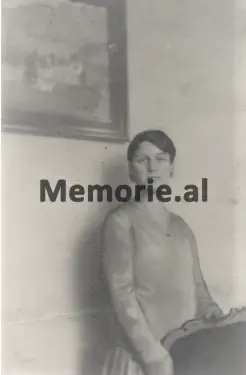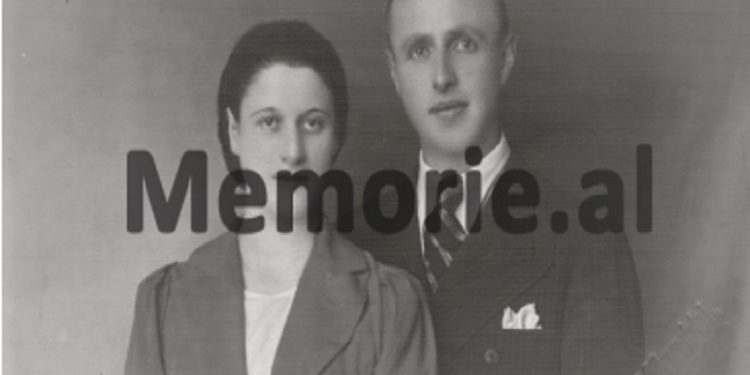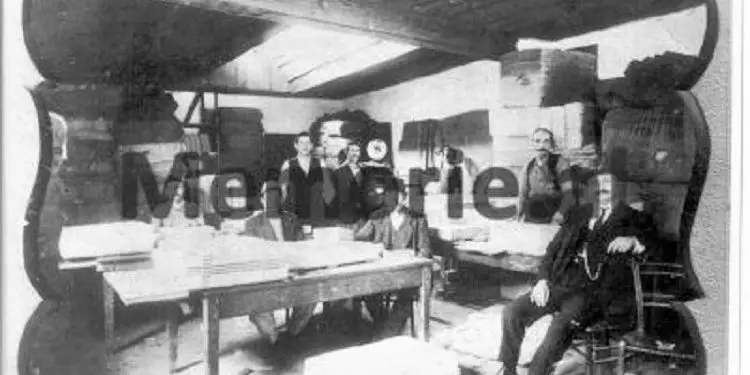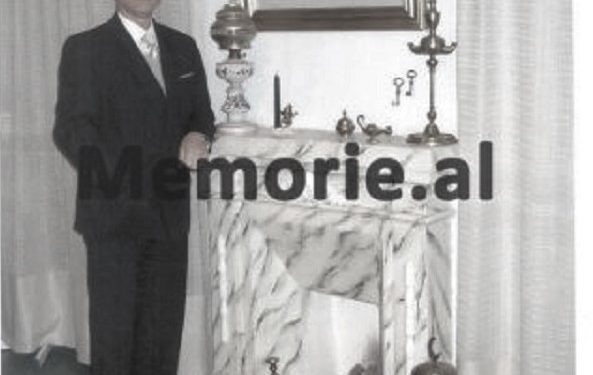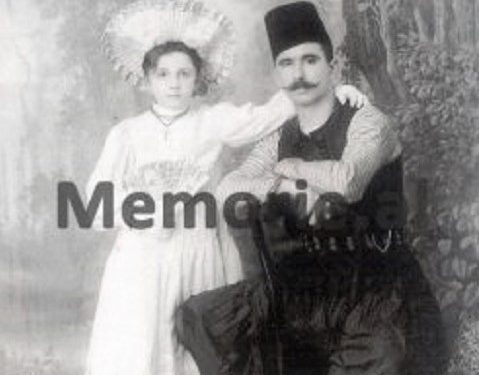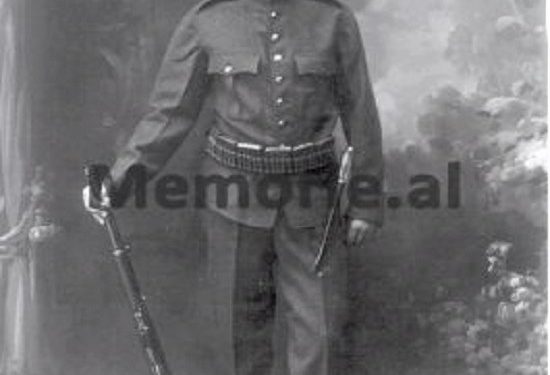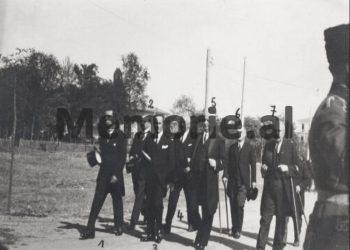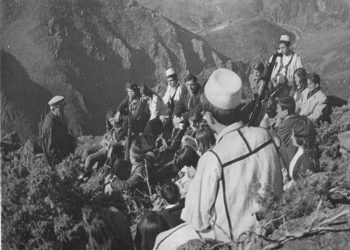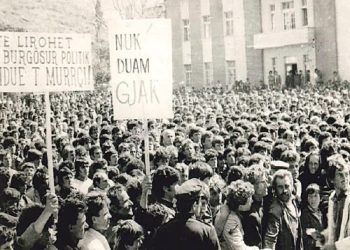Dashnor Kaloçi
Memorie.al publishes the unknown story of the famous Shkodra family, Daragjati, where its ancestors were known as great merchants and industrialists, who in 1860 imported from Austria and brought the first machinery and workshops to the city of Shkodra, which they were used for the production of cigarettes, the cutting of tobacco papers, the preparation of corn silage, the production of braids for national costumes and socks, etc., where they also employed many workers. The testimony of one of the suckers of this family, Henerrik Daragjait, regarding the patriotic activity of the members of this rich and noble family from Shkodra who after the communists came to power in November 1944, ended up in prisons and internments, suffering also for the bread of the mouth…
In the ancient city and with the traditions of Shkodra, somewhere in the old street of Gjuhadol, near the Church, the Assembly, the School and the Printing House of the Franciscans, where some of the most prominent personalities of Albanian art, culture, politics and letters lived, such as Cardinal Mikel Koliqi, Luigj Gurakuqi, Kol Idromeno and Ndoc Çoba, there is still a very special gate that belongs to the famous house of the Daragjatëve, which was built 120 years ago. That old family from Shkodra has been known throughout the city, not only for the fact that its ancestors were engaged in trade and were very rich, but also for their patriotic and patriotic activity. Regarding the past of this family, Henrik Daragjati, one of her suckers who has worked as a teacher in the city of Shkodra for many years, introduces us to his testimonies.
Ndoc Daragjati House
According to the testimony of Henrrik Daragjati, one of the first most famous of this old Shkodra family, was Ndoc Pjetër Daragjati, who married a young girl of his fellow citizen, named Luke Ndoca, who came from the family from which the old Ndocaj street got its name. From that marriage they had eight sons, who were named: Pjetër, Gaspër, Nush, Ndrekë, Kole, Gjon, Zef and Lazër. Although Ndoc Daragjati had not built a large school for himself, he took care of his children’s education. Thus, the eight sons of Ndoc Daragjati, were initially educated at the Saverian College of the city of Shkodra, which at that time was one of the most famous colleges not only in Albania but also in the Balkans. The eldest of the children, Gjoni, was one of the first six students of the city of Shkodra who had graduated from the first (secondary) Commercial school that had been opened by the Italians in that city since 1900. The other brother, Kola, who who at the age of ten was sent to study at the Franciscan Congregation of the city of Brescia in Italy, did not have the fortune to live long after he died quite young. Kole Daragjati constantly wrote poetry and had a great passion for literature. The old house where the family of Ndoc Pjetër Daragjati has lived for a long time, is still located there on Gjuhadolit Street and it is a typical Shkodra house built with an old-style architecture where its main gate stands out which has been built since in 1896. Also, in its interior, the porch, wooden railings, pitcher, stone trough, etc. stand out. 100 years ago, that characteristic building from Shkodra was transformed, turning into the style of the time. Since then its rooms have all been decorated with chimneys and round tables and skillfully carved with special mosaics, shelves with large mirrors and artistic decorations, as well as armchairs that were purchased in Venice. Also hanging on its walls were artistic mirrors, photographs, paintings, cobwebs, and large, beautiful chandeliers hanging like chandeliers. The bronze tangar and a rare work of art (charcoal grill) that was bought in Turkey and used by that family for decades, reads: “Hanem Hatixhe, the wife of the builder Hasan Pasha 1871” (translated by i deceased Hamdi Bushati). That characteristic house in Shkodra was slightly damaged by the bombing of the city in 1913, when Shkodra was surrounded by Serbo-Montenegrin armies. Around 1923, the backyard was decorated with a khaki tree that was brought from outside in a barrel with soil. At that time that tree was called “Adam’s Apple”, because it always bore fruit. Exterior and interior views of the premises of this house have been focused for 100 years ago by well-known photographers of the Marubi family and in its Photo, Library are preserved a large number of negatives from this family.
Family business activity
The Daragjati family has been well known throughout the city of Shkodra, as it has been involved in trade and has been quite wealthy. Regarding this, it is also mentioned in the book of the History of Albania (volume II, Tirana 1984, p. 59) where among other things it is said: “In the years 1850-1860 when Turkey allowed the trade relations of Albania with Europe, it was the steam ships “Skutarini” of the Daragjati family who started the trade “. In this regard, Henrrik Daragjati adds: “The workshop with machinery imported from Austria, had five workers who worked it and it produced braids (cords) for national costumes that were ordered there and then distributed not only throughout Albania, but also in Kosovo and Montenegro. That machine produced five bytes at a time and was propelled by a worker through a large flywheel, while other machines performed other auxiliary processes. The commercial and economic activity of the Daragjati family is also mentioned in today’s university textbook “Economic Geography”, where, among other things, it is said that the first paper cutting machine was in Shkodra near the Daragjati family. The seven-worker workshop prepared packs of cigarette paper for export and its packaging was written in Turkish and Italian. The Daragjati family also owned three maikneri for the preparation of corn silage. Those machines which were used by two workers, were the first to be brought to Shkodra by our family. Since the Daragjati family consisted of many members, they had also brought a machine for the production of socks, which was then donated to another family from Shkodra as a sign of charity to make a living. Also, among the first items brought to Shkodra by the first of our family, were the gramophone and the doorbell with batteries. When Gjon Daragjati first went shopping with his bicycle that he had brought from Italy, some fanatics attacked him with a fork and destroyed his bicycle that he was taking out of the house for the first time. After the death of the head of the family, Ndoc Daragjati, was his wife, Lukja, a noble woman with a lot of authority who remained at the head of the family. After Ndoc’s death, the family’s economic activity continued to be run by his eldest son, Peter, while the other brother, John, who had graduated from high school, left the account to support him. In 1919, the Daragjati brothers, thought of setting up the first private bank in that city (Daragjati Bank) but they failed in that project, as Austria-Hungary lost the war and the money was devalued considerably. In addition, another loss for the Daragjati family was also the enterprise that Ndrekë Daragjati took over with his partner, Murat Haxhia, who in 1933 took over the drying of the Kakarriqi Swamp “, testifies Henrrik Daragjati regarding the economic-commercial activity of that family that brought the first textile and paper machines to the city of Shkodra in the first years of the last century.
Political activity
The Daragjati family was not only known for its economic-commercial activity, but the men of that house were also involved in political and patriotic activities, which, in addition to the testimonies of the suckers of this family, is also known from some documents found in the Central State Archive. In one of these documents dated December 4, 1910, there is a letter from Gjon Daragjati, which he sends to Luigj Gurakuqi, where he writes, among other things:
“Dear friend. I received the letter / post. tanden 27.11 that I also went to pray, I felt that I had not written to you since you were in Elbasan, but I did not write to you that you would touch politics, and the fear of the Turkish post did not leave me write my thoughts with it. Not alone, like your friend and your ships, but all of Shkodra who feel the love of the country… but as much as we feel the punishment that she wanted to gather water, our patriots, our heart cried, and dispersed without being able to do anything bars to help those Albanian witnesses (independence of being on their own) of Albanian. Now the time has come for us to take our blood and to see these blackheads like dust, despised by the people who have so proudly taken them by the feet. It is time for us to organize, to do some good and praiseworthy work for our mother, and it is time for us to gather and unite in one thought, and this union of ours to take open for all the areas of Shqypnis, and in all its sides to have adepts (suitable people) who work for its prosperity and progress…”.
Regarding the further political activity of the Daragjati, Henrriku testifies: “The Daragjati brothers were participants and activists in the first patriotic club called” Gjuha Shqipe “established in 1909 by Muço Qulli and Çerçiz Topulli, who met in Gjuhadol with some of the most famous patriots of the city of Shkodra. An article published in the Boston newspaper “Dielli” by Nush Koçi states, among other things, that Ndrekë Daragjati was imprisoned by the Turkish authorities because he was a member of the “Relief Committee” and that his two brothers, Gjoni and Zefi, were participants in the uprising led by Dedë Gjo Luli. For this reason, he was hanged, but escaped from an intrusion made by our family friends. According to the stories of Father Donat Kurti, brothers Zef and Gjon Daragjati, were members of a group of young people who on May 16, 1912, raised the national flag in the village of Bardhej located on the outskirts of the city of Shkodra. In 1914, the uniform needed for the Albanian National Army was ordered in the Italian capital, Rome, to the merchant Pjetër Daragjati, and in that uniform the national symbol was clearly visible in the hats. The sons of the Daragjati family were among the first to leave the national costumes which were to be used only on holidays and dressed in European costumes. For this, the popular creator Gjon Çela, had written the poem entitled “Kanga e brakeshalive”, where he lamented the tailors of Shkodra who would be left without work, as the new costumes would come from Europe. In that poem, among other things, it is said: “Where did we escape this hour / We saw our friends in this predicament / These son of Ndoc Daragjati / the young man came back small and big”. Also, one of the three young girls’ painters, students of the great master of painting, Kol Idromeno from Shkodra, was also Cesarina Gaspër Daragjati, who participated with her paintings in the first exhibition of “artistic works”, which opened from Shkodra girls in 1925, under the auspices of the cultural society “Rozafat”. Ndoc Pjetër Daragjati was also well known from the Daragjati family, who together with Father Gjergj Fishta and Father Pal Dodaj, were awarded medals and diplomas for the preparation of the Albanian pavilion in the exhibition “World Missionary” which opened in the Vatican in 1925. This is also made known by an article by the researcher Willy Kamsi, published in “Hylli i Dritës” of 1966 ″, recalls Henrrik Daragjati about his family ancestors, who, among other things, were also known as quite humane people.
Humanism of the Daragjati family
Among the many charities that the Daragjati brothers had done, in the city of Shkodra is well known an event with a little boy that they took to their home. On their way home from the bazaar, two of the Daragjati brothers found a hungry and naked child on the street, who had fled the highlands for his family’s revenge problems. After asking him for his name, they took him home and made him part of their family. Coincidentally, that boy was named Cole, just as the son of this family who studied at the Franciscan school in Italy. After a few years, the blood relatives of that family dictated that boy and after that the Daragjati brothers were forced and sent him to America to one of their most trusted men. But despite the humanization and care of the Daragjati family, that boy from the highlands of Shkodra did not have a long life, as he died of tetanus before he was in his thirties. But all that we said above about the famous Daragjati family, whose ancestors are known as the first industrialists in Albania, now belongs only to the past, because the splendor of that family faded with the arrival of the communists in power in 1944 After that year, their property and possessions were confiscated and some of the men of that family ended up in prisons and internments and others could hardly make a living./ Memorie.al




